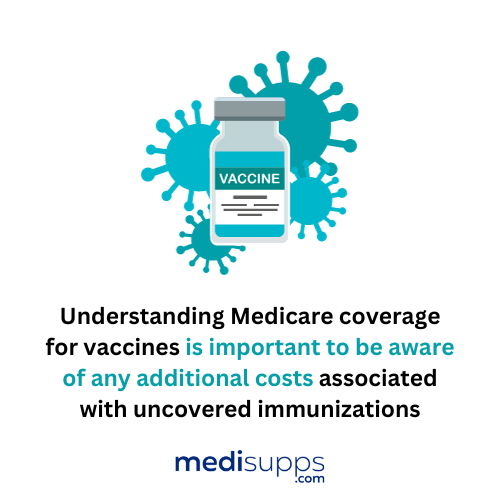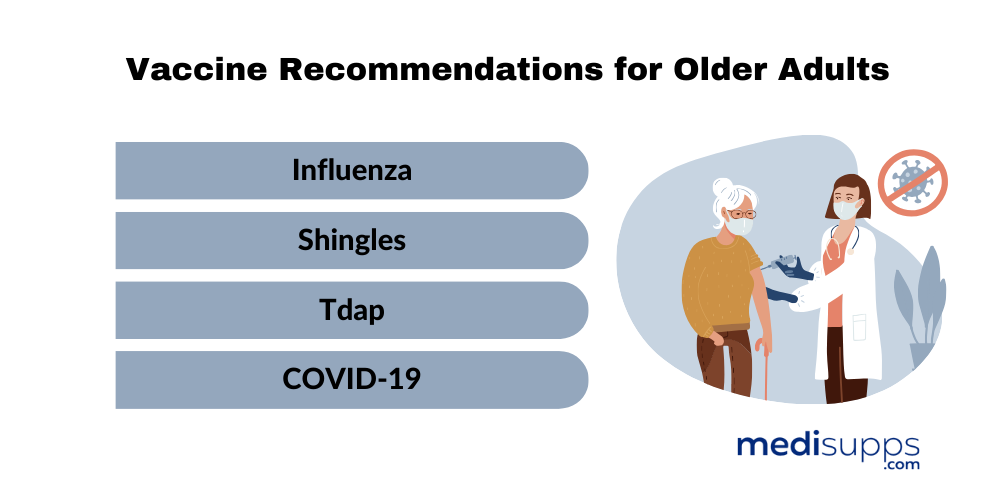
by Russell Noga | Updated December 18th, 2023
What Vaccines Does Medicare Not Cover
 Vaccinations play a crucial role in protecting our health, but navigating the complexities of vaccine coverage can be daunting. Fear not!
Vaccinations play a crucial role in protecting our health, but navigating the complexities of vaccine coverage can be daunting. Fear not!
In this blog post, we’ll explore the ins and outs of Medicare coverage for vaccines, so you can understand what vaccines does Medicare not cover and how to ensure you’re up to date with the necessary immunizations.
Let’s dive in!
Key Takeaways
- Understanding Medicare coverage for vaccines is important to be aware of any additional costs associated with uncovered immunizations.
- Contact your Medicare plan provider or use the website to determine vaccine coverage and explore pharmaceutical assistance programs and local health department programs for lower out-of-pocket costs.
- Discussing recommended vaccinations with a healthcare provider can help ensure proper immunization and protection from serious illnesses.
Understanding Medicare Coverage for Vaccines
Medicare offers coverage for various vaccines through Part B and Part D to help protect your health and keep healthcare costs in check.
Specifically, Medicare Part B covers:
- COVID-19,
- flu,
- hepatitis B,
- and pneumonia vaccines.
On the other hand, Medicare Part D, a prescription drug plan, covers all other vaccines recommended by the Centers for Disease Control and Prevention (CDC).
To better understand what Medicare covers in terms of vaccinations, it’s essential to consult the guidelines provided by the Centers for Disease Control.
Medicare’s vaccine coverage, including Medicare Advantage, aims to alleviate individuals from bearing the full cost of essential immunizations. Current legislation nullifies any personal expenses for recommended vaccines covered by Part B or Part D, thereby allowing you to prioritize your health without the stress of vaccination expenses.
Medicare Part B Vaccine Coverage
Medicare Part B covers specific vaccines without any deductibles or copayments for eligible individuals. These include:
- Flu vaccine
- Pneumonia vaccine
- Hepatitis B vaccine
- COVID-19 vaccine
Moreover, Part B covers not only routine medical services but also vaccines that may be necessary in the event of exposure to a hazardous virus or bacteria. Such coverage guarantees access to vital immunizations to help maintain your health.
View Medicare Rates for 2024
Enter Zip Code
Medicare Part D Vaccine Coverage
Medicare Part D provides more comprehensive coverage for vaccines compared to Part B. It covers all CDC-recommended vaccines, including:
- Hepatitis A
- Hepatitis B
- RSV
- Shingles
- Tdap
As a result, a more extensive range of immunizations become available to protect you against various diseases.
Starting from January 1, 2023, the Inflation Reduction Act has eliminated all out-of-pocket costs for CDC-recommended vaccines for adults, addressing the issue of health care costs.
However, the cost of vaccines covered by Part D may still vary depending on the particulars of your plan and the provider. Understanding the specifics of your plan is key to receiving the right immunizations without incurring unexpected costs.
Vaccines Not Covered by Medicare
While Medicare covers a wide range of vaccines, there are certain vaccines that may not be covered. These include:
- international travel vaccines,
- and non-Advisory Committee on Immunization Practices (ACIP) recommended vaccines.
Knowing which vaccines aren’t covered enables you to make informed health decisions and anticipate any extra costs these vaccines may incur.
International Travel Vaccines
International travel vaccines, such as yellow fever, typhoid, or hepatitis A, are generally not covered by Medicare. These vaccines are recommended or required for individuals traveling to certain countries or regions to protect against diseases prevalent in those areas.
Since these vaccines are considered to be for travel purposes rather than for preventive healthcare within the United States, Medicare does not provide coverage for them.
Non-ACIP Recommended Vaccines
Vaccines not recommended by the ACIP may not be covered by Medicare. The ACIP is an esteemed group of medical and public health experts that develops immunization recommendations for the United States. They provide expert advice and guidance to the CDC on vaccine use and safety.
Certain non-recommended vaccines by the ACIP may not be covered by Medicare, as they may not be deemed commercially available, reasonable, and necessary to prevent illness, or may be covered under Medicare Part B.
How to Determine Your Vaccine Coverage
 Knowing what your vaccine coverage entails is vital to avoid unexpected costs while getting the required immunizations.
Knowing what your vaccine coverage entails is vital to avoid unexpected costs while getting the required immunizations.
To ascertain your vaccine coverage, you can contact your Medicare plan provider or use the Medicare.gov website.
Both methods can provide you with valuable information about the vaccines covered under your specific plan.
Contacting Your Medicare Plan Provider
To contact your Medicare plan provider, including your Medicare Advantage Plan, regarding vaccine coverage, you can call 1-800-MEDICARE (1-800-633-4227) or log into your secure Medicare account online.
By contacting your plan provider, you can inquire about specific vaccine coverage and any associated costs. This can assist in managing your healthcare expenses and guaranteeing you receive the necessary immunizations.
Using the Medicare.gov Website
The Medicare.gov website is an excellent resource for finding information about vaccine coverage under your specific plan. To access the relevant information, follow these steps:
- Visit www.medicare.gov
- Use the search bar to search for ‘vaccine coverage’ or ‘COVID-19 vaccine’.
- Look for pages or sections related to vaccine coverage.
- Click on the relevant page or section to access detailed information about vaccine coverage under Medicare.
The Medicare.gov website provides personalized vaccine coverage information specific to your plan.
Utilizing the website allows you to stay current with the latest information about vaccine coverage and helps avoid unexpected costs while receiving the required immunizations.
Tips for Reducing Out-of-Pocket Costs for Uncovered Vaccines
For vaccines not covered by Medicare, there are other options available to help reduce out-of-pocket costs. These include:

- pharmaceutical assistance programs,
- and local health department programs.
Exploring these options can enable you to get vital vaccinations while minimizing your overall cost.
Pharmaceutical Assistance Programs
Pharmaceutical assistance programs can offer discounts or financial assistance for vaccines not covered by Medicare, as well as prescription drug coverage for uninsured or underinsured individuals who may be eligible for these programs.
Companies such as Merck, GSK (GlaxoSmithKline), and Pfizer offer assistance programs that provide free or low-cost vaccines to eligible individuals.
Local Health Department Programs
Local health department programs may also provide low-cost or free vaccines for eligible individuals, especially during the flu season.
These programs typically provide recommended vaccines such as:
- flu
- pneumonia
- tetanus/diphtheria/pertussis boosters
- hepatitis A and B
- HPV vaccines
To locate local health department vaccination programs in your area, you can use websites such as Vaccines.gov or the CDC’s Vaccine Finder, or even visit a nearby doctor’s office.
The Importance of Staying Up-to-Date with Vaccinations
Keeping current with vaccinations is key to maintaining health, particularly for older adults. Discussing vaccine recommendations, including covered vaccines, with your healthcare provider is essential to ensure you get the right immunizations.
By staying informed and following the advice of health care professionals and the CDC, you can protect yourself from vaccine-preventable diseases and maintain your overall well-being.
Vaccine Recommendations for Older Adults
For older adults, adhering to vaccine recommendations from healthcare professionals and the CDC is of utmost importance.
These recommendations are designed to offer optimal protection for older adults, as their weakened immune systems and age-related changes make them more susceptible to certain diseases and place them in a high-risk category.
The CDC recommends that adults aged 50 and over receive the following vaccinations, including the shingles vaccine:
- Influenza
- Shingles
- Tdap
- COVID-19
This can help protect them from serious illnesses and complications. Additionally, the pneumococcal vaccine is recommended for those aged 65 and up.

Adhering to these guidelines and maintaining regular discussions about vaccination needs with your healthcare provider helps secure the necessary immunizations for your health.
Discussing Vaccines with Your Healthcare Provider
Regular dialogue with your healthcare provider about your vaccination needs is vital to keep abreast of necessary immunizations.
Your healthcare provider can offer personalized advice based on your medical history and health status, as well as address any questions or concerns you may have about vaccines.
To prepare for a vaccine discussion with your healthcare provider, consider reviewing your vaccination records, researching the latest vaccine recommendations, and preparing a list of questions or concerns.
By engaging in open and honest conversations with your healthcare provider, you can make informed decisions about your immunization needs and ensure that you receive the best protection against vaccine-preventable diseases.
Summary
In conclusion, understanding Medicare coverage for vaccines is essential to maintaining your health and managing healthcare costs.
By staying informed about vaccine coverage, exploring assistance programs for uncovered vaccines, and regularly discussing vaccination needs with your healthcare provider, you can protect yourself from vaccine-preventable diseases and maintain your well-being.
Remember, staying up-to-date with vaccinations is not only an investment in your health but also a crucial step towards living a happy and healthy life.
Get Quotes for 2024 Now
Enter Zip Code
Frequently Asked Questions
What vaccines are covered by Medicare in 2023?
As of 2023, Medicare will cover the Tdap and shingles vaccines, as well as most commercially available vaccines, with the exceptions of flu, pneumonia, hepatitis B, and COVID-19 vaccinations which are covered by Part B.
Why is a tetanus shot not covered by Medicare?
Tetanus shots are not covered by Original Medicare, as they are excluded from coverage unless they are directly related to the treatment of an injury or direct exposure to a disease or condition.
Medicare Advantage plans typically cover medically necessary tetanus shots, but in general preventive immunization is not covered.
What injections are covered by Medicare Part D?
Medicare Part D covers most commercially available vaccines, including the vaccine for shingles, as well as other recommended adult immunizations like tetanus, diphtheria, and pertussis. Exceptions to this are flu, pneumonia, hepatitis B, and COVID-19 vaccinations, which are covered by Part B.
Which of the following is excluded from Medicare coverage?
Medicare does not cover non-medical services such as private hospital rooms, hospital television and telephone, canceled or missed appointments, and copies of x-rays.
Are international travel vaccines covered by Medicare?
Unfortunately, Medicare does not cover international travel vaccines like yellow fever or typhoid vaccines.
Find the Right Medicare Plan for You
Finding the right Medicare Plan 2024 doesn’t have to be confusing. Whether it’s a Medigap plan, or you want to know which vaccines Medicare does not cover, we can help.
Call us today at 1-888-891-0229 and one of our knowledgeable, licensed insurance agents will be happy to assist you!

Russell Noga is the CEO and Medicare editor of Medisupps.com. His 15 years of experience in the Medicare insurance market includes being a licensed Medicare insurance broker in all 50 states. He is frequently featured as a featured as a keynote Medicare event speaker, has authored hundreds of Medicare content pages, and hosts the very popular Medisupps.com Medicare Youtube channel. His expertise includes Medicare, Medigap insurance, Medicare Advantage plans, and Medicare Part D.


